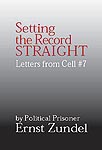|
|
March 4, 2005
The state's immune system, run amok
GEORGE JONAS, National Post, 3 March 2005
I suspect 65-year-old Holocaust-denier Ernst Zundel dearly wishes he were a
security threat. Unlike Federal Court Justice Pierre Blais, however, I don't
think he is. I think the obnoxious pamphleteer is just a contemptible crank.
But whether Judge Blais was right or wrong last week when he found Zundel a
security threat isn't the important issue. The important issue is what's
happening to the rule of law in Canada.
Until recently, if the authorities believed that someone committed an
offence, they could arrest him. If they were able to convince a court that
he was dangerous or a flight risk, they could have the judge deny him bail.
Prosecutors could hold an accused in custody until trial, then present
whatever evidence they had in open court, and let the chips fall where they
may.
What the authorities couldn't say was:
"Trust us, judge, he's a bad guy. Can't tell the public how we know, and we
certainly can't let him test the evidence, but take our word for it."
This changed on June 18, 2002, when the Immigration and Refugee Protection
Act (IRPA) came into effect. IRPA enables the authorities to arrest, hold
without bail, and eventually deport a person by satisfying one Federal
judge, on evidence that need not be revealed to the suspect and his lawyer,
at a hearing that neither the suspect nor his lawyer is entitled to attend,
that the detainee is a security risk.
Currently, IRPA affects only foreign visitors and permanent residents, not
Canadian citizens. Still, it's a law fit for a police-state.
IRPA isn't unique. In the wake of 9/11, similar laws have been passed in
several Western nations, including the United States (The Patriot Act) and
Great Britain (Prevention of Terrorism Bill). The latter was recently
revised after Britain's Law Lords told the government how they felt about
it.
Defending the revised version in Parliament, British Prime Minister Tony
Blair said last week that "we have listened to the Law Lords, but also to
our police and security chiefs." Decoded, Mr. Blair's phrase meant that the
state retained as much arbitrary power as it believed it could get away
with.
When terrorists crashed planes into the Twin Towers, they injured the West
in three ways. Tragic as the loss of thousands of lives was, it was the
least injurious. Greater harm resulted from the intrusiveness and
inconvenience of unavoidable security measures. The greatest injury,
however, came when society's reaction let Big Government burst from its
garbs like the Incredible Hulk.
IRPA-type laws are the state's immune system run amok. They're a form of
lupus, attacking the body politic. When the state's case cannot be tested,
there's no presumption of innocence any longer. The law doesn't become
Draconian as much as Kafkaesque. With the accused presumed guilty, the
potential for error expands exponentially. Immigrants become vulnerable to
blunders, from mistaken identity to personal vendetta by informers.. Dissent
is criminalized. The line between opinion and conduct is obliterated. The
authorities start proceeding against people of objectionable views who pose
no security threat whatever, as officials are notoriously poor at telling
evil-thinkers from evil-doers.
IRPA-type laws tend to degenerate into a tool of identity politics - used,
say, against the likes of Zundel to placate the Jewish lobby which is upset
with the government for having previously placated the Arab lobby. Worse,
such laws lead to a general erosion of due process. Secret hearings against
suspected terrorist aliens blossom into secret hearings against suspected
terrorist citizens and end with secret hearings against all citizens.
Slippery slope? Let's just say it's a tendency for today's exception to
become tomorrow's norm. Even in traditional criminal trials, where
defendants have an opportunity to cross-examine witnesses, miscarriages of
justice occur. It's easy to see how unreliable the system becomes under an
IRPA-type regime, with most safeguards removed.
Noting this isn't to dismiss the real threat posed by terrorists. Security
is paramount - except it isn't enhanced by the incarceration or deportation
of people who do nothing to jeopardize it.
In modern times the road to statism is paved with the rulings of
well-intentioned judges. Looking at the cast of characters in last week's
psychodrama reveals a painful irony. Zundel, the historical revisionist, is
an arthropod. His denial of the Holocaust - episodes of which I witnessed
myself as a child in Nazi-occupied Europe - makes him not only repugnant but
ridiculous.
In contrast, Justice Blais is a distinguished jurist with a sound
understanding of history. Yet when he ruled that it was all right for the
government to deport the pamphleteer - having held him in solitary
confinement in a Toronto jail without a charge for two years, on a national
security certificate issued by the Solicitor-General and the Minister of
Immigration and Citizenship - I contend the eminent judge posed a threat to
civil liberties and the rule of law in Canada the verminous Nazi-apologist
could only dream of.
===== ===== =====
|

|
Setting the Record Straight: Letters from Cell # 7
$10 - 180 Pages
Find out who this "premier thought criminal" really is -
how he thinks, how he writes, what he's really saying! You will
be astonished to learn why this man is so feared by the world's
manipulators of your thoughts!
Order form: HTML
format | PDF
Format |
Reminder:
Help free Ernst Zundel, Prisoner of Conscience. His
prison sketches - now on-line and highly popular - help pay for his defence.
Take a look - and tell a friend.
http://www.zundelsite.org/gallery/donations/index.html
|

Please write to Ernst Zündel, let him know that he is not
alone:
Justizvollzuganstalt Mannheim
Herzogenriedstr. 111
D- 68169 Mannheim
Germany
Tel. 49+621 3980, extension 217.
|
|
|